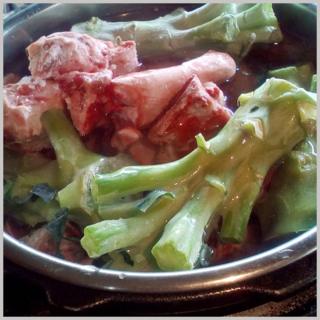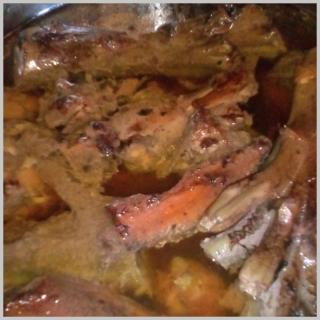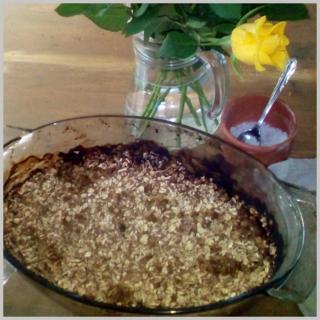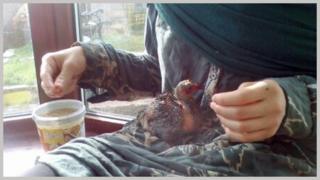 Image copyright Katie Holden
Image copyright Katie Holden My Money is a new series looking at how people spend their money – and the sometimes tough decisions they make. Here, Katie Holden from Bradford, records her spending over a week, and shares tips for saving which is especially important because she has nine children.
We’re looking for more people to share what they spend their money on. If you’re interested, please email my.money@bbc.co.uk or get in touch via our My Money Facebook group and we’ll aim to contact you.
Katie is a home-schooling mother of nine children. The eldest two are studying A-Levels at college and the youngest is a toddler. Her husband is a maths teacher who also runs a rental business for extra income. Her family is obsessed with road cycling and last summer one of her sons won a local triathlon.
She has used cloth nappies for all of her nine children: “They still work just fine, incidentally, and have saved us a bonny penny over the years.”
She also says she has three wonderful cats and also keeps “too many” pigeons, rabbits, quails and gerbils. She likes to crochet, grow vegetables and go camping.
Katie’s week: Chinese medicine, bike frames, pigeon food and stew

To start the week I made a vast pot of stew, which my 15-year-old son later honours with the accolade of being “half decent.” Feeling dizzy with joy on hearing such extravagant praise, I feel it is only fair to share the recipe with a world undoubtedly breathless with anticipation.

Method
1. Fry three chopped onions, five garlic cloves, five grated carrots and one huge grated marrow-type thing (homegrown so I’m not sure what it is exactly) in coconut oil until the juices have evaporated and the vegetables are browning.
2. Add a large serving spoon of ras el hanout (cheapest source is the internet) and a teaspoon of turmeric (from an Asian supermarket), three tins of chopped tomatoes, 1.5 litres of home-made chicken stock and 1 kg of dry red split lentils. When the mix is boiling, reduce the heat, cover and simmer until the lentils are cooked (at least an hour). Stir occasionally to prevent the lentils sticking and burning.
3. Add any chopped green vegetables to hand (today this means frozen peas), season with salt and pepper and cook until the vegetables are done. Put some aside for the freezer and keep the rest for the week ahead.
4. Serve with rice and yoghurt containing chopped, fresh coriander.
Here I am with six of my children. The oldest four didn’t want to be photographed.
 Image copyright Katie Holden
Image copyright Katie Holden 
Total spend: £5.89

I top up my mobile with £10 today, sending my balance rocketing to a whopping £11.36. I can afford this reckless spending spree because (wait for it) Etsy have refunded me £92 for a non-existent picture I paid for two months ago. Actually, I paid £102 for this myth when you include tax, so have lost £10 for two months of owning nothing but a beautiful dream…
I defrost the freezer and start making stock with all the sheep bones and trotters that were lost in its icy depths. Our local butcher sells bones really, really cheap and gives us left over chicken bones for free. They make fantastic stock and the cats eat any leftover scraps of meat.
Recipe for stock
1. Put bones and any vegetable scraps in a pan.
2. Cover with water and once it has boiled, cover and simmer on a very low heat for hours and hours and hours to get the nutrients out of the bones.
Before and after pictures of bone stock:
 Image copyright Katie Holden
Image copyright Katie Holden 
 Image copyright Katie Holden
Image copyright Katie Holden 
When I take the car out in the evening it has the deep, distinctive roar of a knackered exhaust pipe which really needs replacing. Something else that will cost money to fix!
Total spend: £10
Total gained: £92

A blessedly cheap home-schooling day today. After the morning’s maths lessons I cut my seven-year-old son’s hair (£0 – oh how good it feels to not spend money!). The kids carve three pumpkins (£2 per pumpkin). We put the pumpkin seeds on a tray to dry out for our pet gerbils and rabbits to eat and I boil the flesh for soup.
All in all, home-schooling is one of our most expensive lifestyle choices. Each GCSE our children take costs £500 – £1,000 in exam fees, workbooks, tutors, textbooks, revision guides etc. This is on top of the costs needed to get the children through their primary years and funding the numerous projects and hobbies they’ve acquired. The greatest cost, however, is that I am not at work, investing in a career and earning money. On the plus side it is rewarding work and I am convinced the advantages to our children in terms of their personal freedoms and independence make home-schooling worth it (most of the time, anyway).
I put £10 on the new Sim card I bought for my 16-year old’s phone. This means we’ve lost the £2.52 he had on his old Sim, which O2 had said they’d reimburse, but failed to do. I can’t be bothered with the effort of chasing down the £2.52, to be honest.
As the weather has started to turn, I light a fire in the evening. This works out free as we salvage wood and leave it to dry outside over the summer. Here’s a picture…
 Image copyright Katie Holden
Image copyright Katie Holden 
Total spend: £16

Today we are expecting guests, another home-schooling family, for lunch. I nip to our local Aldi with my nine-year old and buy £9.19 worth of salad and cheese for lunch (jacket potatoes with salad). We pop into the post office to send my daughters’ pen friend a parcel containing a painted stone they are convinced is a dinosaur tooth, although I have my doubts. I also spend 61p on a second class stamp and buy a game from our local charity shop for £2.
On returning home I have a heated exchange of words with my 15-year old when I ask him to go back to the shops I’ve just been to so he can buy the tins of sweetcorn I clean forgot to get three minutes ago. He mumbles darkly about shopping lists and their uses until, amazingly, my 16-year-old son volunteers to go. I give him £5. He returns with two extremely cheap tins of corn and says he needs to keep the change for college.
I make apple crumble with apples from the garden for pudding (the roses are a gift from our guests).
 Image copyright Katie Holden
Image copyright Katie Holden 
Total spend: £16.80

With a large family we are constantly choosing how and where it is best to spend our money. We save a lot by cooking from scratch and avoiding processed foods (which are expensive and unsatisfying) and most of our things we buy second hand. We scour the internet for bulk-buy bargains to reduce our grocery bill and use our possessions until they break, fall apart or disintegrate.
However, I do not want our children to grow up feeling deprived or resenting our totally unfashionable, low-tech, penny-pinching ways. When I do splash out I want it to be on worthwhile experiences; real things that make memories. This is my roundabout way of justifying the £110.42 I paid today to enter a cycling sportive. My husband is going on the shortest route with four children, whilst our eldest three children are doing “the monster” which is over 93 miles.
When my husband comes home he is elated to tell me the head teacher of his school took him to one side, thanked him for all of his hard work and promised he would ask the governors to give him a pay rise. He doubts this will actually result in a pay rise as the school has no money, but there’s always a chance.
We ate leftovers for lunch so spent nowt on food.
Total spend: £110.42

I have always wondered why, despite having five dehumidifiers in the house, there is a persistent patch of damp on my bedroom wall. Last night’s storm revealed a leak directly above said wall. The steady drip of water kept me awake but the rhythmic tapping apparently helped my husband get back to sleep. I look about 100 years old in the morning. The roof will need fixing which is other expense lying in wait for us.
Seven of our children begin the day by going for a bike ride. Unfortunately, our eldest son has noticed his bike frame is cracking around the rear brake and this leaves him with the options of:
1. Racing through Yorkshire’s stunningly beautiful, steep hills with reduced braking ability (his suggestion, not mine).
2. Buying another second-hand racing bike.
3. Buying a second-hand carbon frame (we agree this is best).
He finds an okay frame on eBay, bidding ends tomorrow and currently stands at £41.
I take three of our children for swimming lessons every weekend. Although this is a significant cost (£25.50 per week for three children) it is worth every penny.
I buy pigeon food (£31.50 for 60kg). I would personally like to re-home half our pigeons and halve the expense of this particular hobby, but my sensible suggestion was met with mutiny and tears, so the birds are staying and I’m still paying.
Here is my daughter feeding a pigeon chick.
 Image copyright Katie Holden
Image copyright Katie Holden 
The last great expense of the day is borne by my husband who goes with our son for Chinese medicine. It costs £150 for five treatments. They come back with some herbs (for making tea).
Total spend: £207

I do the main grocery shop of the week, online, and spend £94.34. I have thoroughly explored all the options for our main, weekly shop, from driving between shops to hunt down the cheapest groceries, to comparing all the delivery options from the major supermarkets. My honest conclusion is that there aren’t truly astounding savings to be had when you weigh up the marginal differences in price against the quality of food and convenience to the shopper. Currently I’m using Ocado because they have given me a free trial of their delivery saver service. I’m not sure what I’ll do when that ends next month.
My personal bugbear is the way supermarkets price some things per kg, others per 100g, others per 10g and others per item in a multipack. To add to my woes, I am still unsure if the prices advertised online include any special offers, especially when money is knocked off for buying several items. I’m always looking for the best value, which generally means the cheapest items, and the mental arithmetic involved in trying to calculate this with non-standardised pricing would flummox your average quantum physicist.
I refuel the car to the tune of £50.54.
The bike frame we were bidding on goes for £160, which was out of our price range, so we’re back to square one.
Total spend: £144.88
How does Katie feel about her week?
This was pretty much an average week for us. Thanks to this My Money project I have realised we do have good money saving systems in place, such as bulk buying catering packs of food online, which does save a lot.
Most weeks we manage to spend a big chunk of money on less essential items, which was the sport equipment this week, but I don’t want to turn into a money obsessed robot that says no to everything.
I suppose it’s a balance. We look for the cheapest options and then use any money saved to fund the interesting parts of our lives. The downside is that we have absolutely no savings whatsoever, but that’s not unusual for these times.
Total weekly spend: £510.99
Read more: https://www.bbc.co.uk/news/business-50304762


Recent Comments